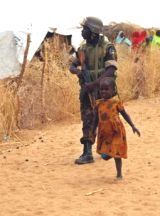63, half of them children, killed by militias in Darfur
Nov 3, 2006 (TINE, Sudan) — Attacks in West Darfur have killed at least 63 people, half of them children, as rebels on Friday accused Khartoum of remobilising Arab militia after suffering two military defeats on the Sudan-Chad border.
 “The government have begun mobilising the Janjaweed widely, especially in West Darfur, because they want to clear the area and move north along the border and defeat us,” said Bahr Idriss Abu Garda, a leader of the National Redemption Front (NRF).
“The government have begun mobilising the Janjaweed widely, especially in West Darfur, because they want to clear the area and move north along the border and defeat us,” said Bahr Idriss Abu Garda, a leader of the National Redemption Front (NRF).
Rebels from the NRF alliance said of the 63 killed at Jabel Moun, 33 were children. The United Nations said 27 of those were under 12 and urged the government to protect civilians.
The African Union said the attacks occurred on Oct. 29 near Jabel Moun, where rebel and government forces are present.
Eight villages were attacked, a U.N. official said, sending a small number of Darfuris fleeing into Chad and thousands others seeking safer shelter around Jabel Moun and Seleha.
“Our team in eastern Chad reported a group of 10 refugees crossed the border fleeing from this incident, where reportedly 300 to 500 Arab militiamen on horseback raided at least eight villages as well as the Hajlija IDP camp,” UNHCR spokesman Ron Redmond told a news briefing in Geneva.
A Sudanese army source confirmed 63 people had been killed but said the strike was in retaliation for a rebel assault on Arabs a month earlier. “They had killed two policemen and two women, one of whom was pregnant,” the source said.
AU soldiers said the government was also bombing regularly in the area around and north of Tine town on the Sudan-Chad border. The last bombardment was on Oct. 23.
Sudanese officials deny they have mobilised Arab militia and the army denies using its Antonov planes, which would be a violation of a U.N. Security Council resolution.
10,000 DEAD
Experts estimate 200,000 people have been killed and 2.5 million forced from their homes in 3-1/2 years of revolt in Darfur. Mostly non-Arab rebels took up arms accusing central government of neglect.
Khartoum turned to militias, known locally as Janjaweed and mainly from Arab tribes, to quell the revolt. Those militia stand accused of a widespread campaign of rape, murder and looting, which Washington calls genocide.
The government denies genocide but the International Criminal Court is investigating alleged war crimes in Darfur.
Sudanese President Omar Hassan al-Bashir on Friday indicated the toll in Darfur had been exaggerated saying only 10,000 people had died in western Sudan.
At a news conference in Beijing where he was attending a summit of African leaders, he reiterated that he would not allow U.N. forces into Darfur, despite a U.N. resolution authorising 22,000 U.N. troops to replace AU peacekeepers.
“We decided that with such an army moving into our country, the impact is going to be the same as what’s been happening in Iraq,” Bashir said.
China, which has close business and diplomatic ties to Sudan, is a veto-wielding member of the Security Council and has been accused by human rights groups of protecting Sudan against any strong action over Darfur.
But at the Beijing meeting, Chinese President Hu Jintao appeared to be nudging Bashir towards accommodation.
“The Darfur issue is again at a critical juncture,” Chinese State television quoted him saying on Thursday.
WAR
An AU-brokered peace deal in May signed by the government and one of three rebel negotiating factions has seen little implementation. A government plan to disarm the Janjaweed by Oct. 22 has not occurred and a new rebel alliance renewed hostilities with the government.
In fact since the deal was signed to much fanfare in Abuja, Nigeria, violence has only increased and a new war has broken out in North Darfur.
The NRF defeated the government in two major battles in the past two months, top U.N. envoy Jan Pronk said. He was expelled for saying army morale was low, generals had been sacked and soldiers were refusing to fight in North Darfur.
Abu Garda said that was why the government was mobilising the militia.
Acting sector commander of Tine base, Thomas Chaona, said Antonovs could be seen or heard flying almost daily along the Chad-Sudan border and on Oct. 13 an AU patrol was almost bombed because the pilot mistook them for a rebel convoy.
“October 13 we sent a patrol out … it was threatened that the patrol should pull back to the camp because the Antonov was up and that Antonov was about to release bombs on our patrol,” he told Reuters.
The UNHCR said it was sending a team to the border area near Birak on the Chadian side to monitor the situation and see what aid the refugees need.
(Reuters)
